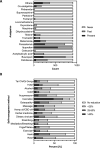The role of self-management in endometriosis pain: insights from a cross-sectional survey in Germany, Austria, and Switzerland
- PMID: 40253561
- PMCID: PMC12334507
- DOI: 10.1007/s00404-025-08019-1
The role of self-management in endometriosis pain: insights from a cross-sectional survey in Germany, Austria, and Switzerland
Abstract
Background: Endometriosis has a significant negative impact on women's lives. Unfortunately, current medical treatments often fail to provide adequate pain relief and may cause intolerable side effects. Although many women experiencing primary dysmenorrhoea employ self-management strategies to help alleviate period-related symptoms, there is a paucity of knowledge about how women with endometriosis manage their symptoms through self-management.
Methods: A cross-sectional online survey was distributed in Germany, Austria, and Switzerland, between August and December 2022, targeting women aged 18 years or older with a diagnosis of endometriosis. The survey gathered information on (pharmacological and non-pharmacological) self-management strategies employed by the respondents in the previous six months, including their frequency, reasons for non-use, self-rated effectiveness, and impact on reducing endometriosis-related medication. Furthermore, the survey collected data on demographics, medical history, current symptomatology, and medication usage. Descriptive statistical analyses were conducted.
Results: Of the 912 valid responses, 75.4% reported using self-management strategies, with the most prevalent being rest (91.6%), heat (91.1%), and exercise (63.3%). The most highly rated techniques in terms of effectiveness in pain reduction were cannabis, osteopathy, heat, and alcohol, with mean effectiveness ratings of 8.0, 7.3, 7.1, and 6.8, respectively, on the Numerical Rating Scale. Interventions, such as Tai Chi/Qi Gong, yoga/Pilates, herbal medicine, stretching, and meditation/breathing, were rated as being less effective. The lack of information and costs were identified as the primary reasons for not utilising self-management approaches.
Conclusion: The findings of this study may provide evidence for the reimbursement of self-management techniques by health insurance companies for the treatment of endometriosis-associated pain.
Keywords: Endometriosis; Non-pharmacological treatment; Pain management; Self-management.
© 2025. The Author(s).
Conflict of interest statement
Declarations. Conflict of interest: The authors declare no competing interests. Ethical approval: The study was approved by the Institutional Review Board of the Charité University Medical Centre (ethical vote EA2/071/22). Consent to participate: Prior to commencing the questionnaire, participants were provided with an information letter, consent form, and their agreement to participate was required.
Figures
Similar articles
-
Oral contraceptives for pain associated with endometriosis.Cochrane Database Syst Rev. 2018 May 22;5(5):CD001019. doi: 10.1002/14651858.CD001019.pub3. Cochrane Database Syst Rev. 2018. PMID: 29786828 Free PMC article.
-
Endometriosis: an overview of Cochrane Reviews.Cochrane Database Syst Rev. 2014 Mar 10;2014(3):CD009590. doi: 10.1002/14651858.CD009590.pub2. Cochrane Database Syst Rev. 2014. PMID: 24610050 Free PMC article.
-
The Swiss Endometriosis Database: a retrospective multicentre cohort study on pain levels and multimodal treatment needs of endometriosis patients.Swiss Med Wkly. 2025 Jun 24;155:3854. doi: 10.57187/s.3854. Swiss Med Wkly. 2025. PMID: 40570280
-
Falls prevention interventions for community-dwelling older adults: systematic review and meta-analysis of benefits, harms, and patient values and preferences.Syst Rev. 2024 Nov 26;13(1):289. doi: 10.1186/s13643-024-02681-3. Syst Rev. 2024. PMID: 39593159 Free PMC article.
-
Does interdisciplinary group care for the treatment of endometriosis improve pain interference: protocol for a pilot randomised controlled trial at an urban academic medical centre.BMJ Open. 2025 Mar 5;15(3):e097372. doi: 10.1136/bmjopen-2024-097372. BMJ Open. 2025. PMID: 40044193 Free PMC article.
References
-
- Harder C, Velho RV, Brandes I, Sehouli J, Mechsner S (2024) Assessing the true prevalence of endometriosis: a narrative review of literature data. Int J Gynecol Obstet 167(3):883–900. 10.1002/ijgo.15756 - PubMed
MeSH terms
LinkOut - more resources
Full Text Sources
Medical


